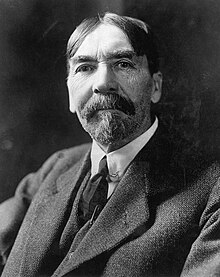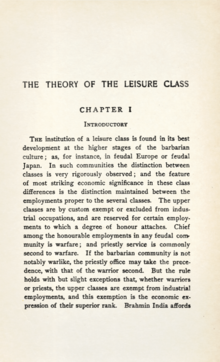Thorstein Veblen
Thorstein Bunde Veblen (born July 30, 1857 in Cato , Wisconsin , † August 3, 1929 in Menlo Park , California ) was an American economist and sociologist .
Life
Veblen was the sixth of twelve children of Thomas Anderson Veblen, a trained carpenter , and Kari Veblen, b. Bunde was born in Wisconsin and raised in Minnesota . His parents immigrated to the United States from Norway in 1848 and worked on their own farm there. From 1874 to 1880 Veblen attended the Protestant Carleton College . In 1881 he began studying philosophy with Charles Sanders Peirce and economics with John Bates Clark at Johns Hopkins University , but in 1882 he moved to Yale University , where he received his Doctor of Philosophy in 1884 under William Graham Sumner . Despite excellent certificates and recommendations, he remained unemployed between 1884 and 1891. During this time his first marriage took place in 1888 and long stays on the farms of his parents and in-laws. Occasionally he worked as a tutor . He continued his studies at Cornell University in 1891 and finally taught from 1892 to 1906 under J. Laurence Laughlin (1850-1933) as an assistant political economy at the University of Chicago . From 1895 to 1905 he served as the managing editor of the newly established Journal of Political Economy . In 1898 his programmatic article Why Is Economics Not An Evolutionary Science? and in 1899 his most famous work The Theory of the Leisure Class ( Theory of the Leisure ).
His private life was as unsteady as his other academic positions. Because of unclear extramarital relationships, he had to leave Chicago in 1906 under pressure from his wife. His reputation suffered as a result. From late 1906 to 1909 he taught economics at Stanford University and from 1911 to 1918 at the University of Missouri at Columbia . During this time he divorced his first wife in 1914. He married his second wife, whom he had known since 1904/05, in 1914. She died in 1920.
Between 1918 and 1926 he taught as one of the co-founders at the New School for Social Research in New York. Between 1918 and 1919 was the period of his greatest public effectiveness as editor of the radical New York literary magazine The Dial .
On August 3, 1929, Veblen died lonely of heart failure in Menlo Park, California, in a wooden hut he had lived in since 1927 .
Fonts
In his anthropological treatise The instinct of Workmanship and the Irksomeness of Labor (1898) Veblen saw two opposing instincts at work in human nature : on the one hand, the predatory instinct , characterized by sportsmanship , i.e. H. a tendency to avoid work and the predatory appropriation of goods, and on the other hand the creative instinct , characterized by workmanship , d. H. man's tendency to transform things in his natural environment through creative and efficient work in the interests of the general public. Workmanship is the dominant feature of early stages of development in human society. Only when social production has crossed the subsistence threshold is the violent appropriation of goods even possible. Sportsmanship thus becomes the cultural ideal of the ruling leisure class , work becomes the stigma of the lower class and the ideal of workmanship wither away .
In his Theory of Business Enterprise (1904) he was one of the first to analyze the emergence of US monopoly capitalism, something no one outside of Marxism had done so thoroughly. Veblen uses the term "monopoly" in a non-specific sense, following Richard Ely . The technological development of large-scale industry ( The Machine Process ) is dominated by the business enterprise , in particular by captains of industry (example: railways, heavy industry) who pursue purely monetary profit goals (in the sense of a capitalization calculation that includes loan financing and the valuation of goodwill ), which are not necessarily on the better supply of the consumer masses or the faster technological progress, but primarily aimed at expanding one's own sphere of power and control. Modern industrial society is characterized by a technological interlinking of industrial processes to form an overall process, which has become extremely susceptible to failure to the same extent. However, it is often in the interests of individual captains of industry not to further develop this process as quickly as possible through technological innovations, but rather to exploit the source of power and profit that lies in this susceptibility to failure, provided that competitors can be eliminated as a result.
As one of the first social scientists, Veblen analyzed the complex relationship between the consumption of goods and social prosperity . Political economy can only be understood and assessed if it is embedded in an institutional framework. The economic processes of production , distribution and consumption should be located in the context of the reproduction of institutions , beliefs , gender and other behavior . The Veblen effect was named after him.
Veblen also analyzed patriotism, war and peace. Disputes over material resources would first have to be transformed into disputes over spiritual capital (e.g. national honor) in order to successfully mobilize masses for violent conflicts and wars.
Veblen is one of the founding fathers of the American institutional economics in the economics . With his three books " Theory of the Leisure Class ", " Theory of Business Enterprise " and " Instinct of Workmanship ... ", a social theory that became well known in the English-speaking world. He sharply criticized the predatory instinct of the upper class, characterized by the consumption of prestige , leisure behavior, parasitism and demonstrative idleness.
Veblen's theories gained particular interest and recognition among the left-Taylorist engineers who were critical of capitalism in the so-called Progressive Era (1900-1917) and during the so-called technocracy movement of the early 1930s
Veblen was a brilliant, multifaceted, often difficult intellectual who had a tremendous impact on economics and social science thinking in the United States, particularly in the Progressive Era and the New Deal era of the 1930s.
Lewis Coser counts Veblen among the classics of sociology .
Fonts (selection)
- The Instinct of Workmanship and the Irksomeness of Labor , American Journal of Sociology. Vol 4, No. 2 (Sep. 1898).
- The Theory Of The Leisure Class. 1899 (literally: The Theory of the Idle Class); Translation: Fine people theory. An economic study of the institutions. Kiepenheuer & Witsch, Cologne / Berlin, 1958. New editions: Fischer, 1997, ISBN 978-3-596-27362-1 ; 2007 ISBN 3-596-17625-5 .
- Why Is Economics Not An Evolutionary Science? ( Memento of October 8, 2007 in the Internet Archive ), 1898.
- The Theory of Business Enterprise. ( Memento of July 27, 2007 in the Internet Archive ) 1904.
- The Instinct of Workmanship and the State of the Industrial Arts. ( Memento of March 18, 2008 in the Internet Archive ) 1914.
- Imperial Germany and the Industrial Revolution. ( Memento of December 11, 2007 in the Internet Archive ) 1915.
- An Inquiry into the Nature of Peace and the Terms of its Perpetuation. ( Memento of July 27, 2007 in the Internet Archive ) 1917.
- The Higher Learning in America. A Memorandum on the Conduct of Universities by Business Men. ( Memento of July 27, 2007 in the Internet Archive ) 1918.
- The Vested Interests and the State of the Industrial Arts. ( Memento of December 21, 2007 in the Internet Archive ) 1919.
- The Place of Science in Modern Civilization and other Essays. ( Memento of June 21, 2004 in the Internet Archive ) 1919.
- The Engineers and the Price System. 1921 (PDF; 275 kB).
- Absentee Ownership and Business Enterprise in Recent Times. 1923.
- The Laxdaela Saga. 1925.
- Essays in our changing order. 1934.
- Geoffrey M. Hodgson (ed.): Essential Writings of Thorstein Veblen. Taylor & Francis, 2011. ISBN 978-0-415-77790-2 .
literature
- Theodor W. Adorno : Veblen's attack on culture. In: Theodor W. Adorno: Prisms. Cultural Criticism and Society. Frankfurt 1955, pp. 82–111 (first 1941).
- Edwin Layton: Veblen and the Engineers . American Quarterly , Vol. 14, No. 1 (spring 1962)
- Robert Böhmer: The Spirit of Capitalism and the Building up of the East. Thelem, Dresden 2005 (current application of Veblen's Theory of the Leisure Class ).
- Douglas Dowd (Ed.): Thorstein Veblen. A Critical Reappraisal. Greenwood, Westport, CT 1958.
- Stephen Edgell: Veblen in Perspective. His life and thought. Sharpe, New York / London 2001.
- Carl Eugster: Thorstein Bunde Veblen. Europa-Verlag, Zurich 1952.
- Joseph Dorfman : Thorstein Veblen and His America. Viking, New York 1934.
- RL Duffus: The Innocents at Cedro - A Memoir of Thorstein Veblen. MacMillan, New York 1944.
- Elizabeth W. Jorgensen, Henry I. Jorgensen: Thorstein Veblen. Victorian Firebrand. Sharpe, Armonk, NY / London 1999.
- Phillip Anthony O'Hara : Marx, Veblen and contemporary institutional political economy principles and unstable dynamics of capitalism. Elgar, Cheltenham 2000, ISBN 1-85898-067-4 .
- Phillip Anthony O'Hara: The contemporary relevance of Thorstein Veblen's institutional-evolutionary economics. Curtin University of Technology, School of Economics and Finance, Perth 2000, ISBN 1-86342-879-8 .
- Reinhard Penz, Holger Wilkop (Hrsg.): Time of institutions - Thorstein Veblens evolutionary economics. Metropolis, 1995, ISBN 3895180270 .
- Renate Rausch : Leisure in American Sociology from Thorstein Veblen to David Riesman. 1959.
- Erik S. Reinert, Francesca Lidia Viano (eds.): Thorstein Veblen: Economics for an Age of Crises. Contributions from the conference in Valdres / Norway on the occasion of the 150th birthday of Thorstein Veblen, 2007. Anthem, London / New York 2012, ISBN 978-1-84331-858-3 .
- David Riesman : Thorstein Veblen. A critical interpretation. Seabury, New York 1953.
- Rick Tilman: A Veblen Treasury. From Leisure Class to War, Peace and Capitalism. Sharpe, Armonk, NY / London 1993.
- Stephan Truninger: The Americanization of America. Thorstein Veblen's American history. Westphalian steam boat, Münster 2010.
Web links
- Literature by and about Thorstein Veblen in the catalog of the German National Library
- Veblen - Classics of Sociology
- Veblen in the time library of economics
Individual evidence
- ^ A b Douglas Dowd: Introduction to the Transaction Edition . In: Thorstein Veblen: The Theory of Business Enterprise . Transaction Books, New Brunswick. NJ. ISBN 0-87855-699-0 . S. V
- ↑ Geoffrey M. Hodgson: On the evolution of Thorstein Veblen's evolutionary economics. (PDF; 1.15 MB) Cambridge Political Economy Society 1998, Vol. 22, pp. 415-431
- ^ Thorstein Veblen: The Theory of Business Enterprise . Transaction Books, New Brunswick. NJ. ISBN 0-87855-699-0 . P. 54, note 2 / RT Ely: Monopolies and Trusts
- ^ Thorstein Veblen: The Theory of Business Enterprise . Transaction Books, New Brunswick. NJ. ISBN 0-87855-699-0 . Pp. 5-19
- ^ Thorstein Veblen: The Theory of Business Enterprise . Transaction Books, New Brunswick. NJ. ISBN 0-87855-699-0 . Pp. 20-176
- ^ Edwin Layton: Veblen and the Engineers . American Quarterly , Vol. 14, No. 1 (spring 1962), pp. 64-72
| personal data | |
|---|---|
| SURNAME | Veblen, Thorstein |
| ALTERNATIVE NAMES | Veblen, Thorstein Bunde (full name) |
| BRIEF DESCRIPTION | American economist and sociologist |
| DATE OF BIRTH | July 30, 1857 |
| PLACE OF BIRTH | Cato , Wisconsin |
| DATE OF DEATH | August 3, 1929 |
| Place of death | Menlo Park , California |

